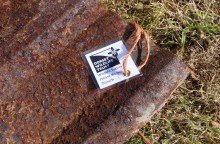Dorset Wildlife Trust (DWT) and Amphibian and Reptile Conservation (ARC) are asking members of the public not to lift up ‘tin’s found on nature reserves. Legally protected reptiles use these for shelter, and disturbing protected species could result in breaking the law.
Conservationists leave small pieces of tin, or sometimes roofing felt, out on heathland and other wildlife sites for reptiles to use as shelter, and to help with conservation survey and monitoring work. Lifting or removal of these tins should only be carried out by a person with a licence to survey for reptiles. Too much lifting of these tins can cause enough disturbance for reptiles to move away from the area completely.
Senior Reserves Manager for ARC, Gary Powell, said, “Understanding the distribution of reptiles is an important part of being able to conserve them. If tins are disturbed outside of an official survey then it can affect the results of the research, as animals will not remain under the tin once it has been lifted. We are concerned for the safety of both humans and animals, as adders also utilise tins and although they are non-aggressive, they may bite if they feel threatened. One of the best ways to see our native reptiles in the wild are those moments when you observe them going about their normal activities. A keen eye and plenty of patience are key ingredients!”
DWT’s Reserves Recording and Monitoring Officer, Amber Rosenthal said, “It is great when people have close encounters with any of the beautiful reptiles that occur on our reserves and taking photographs is a popular way for people to share their experiences, as long as the animals aren’t disturbed by lifting the tins or man- handled to achieve this. Many people don’t realise that lifting these tins can have a negative impact on our snakes and lizards so DWT is now putting notices on the tins on our nature reserves to help ensure the continued protection of these magnificent reptiles.”
All six native reptiles can be found on DWT’s Upton Heath in Corfe Mullen,including the smooth snake, adder and grass snake, the common lizard, slow worm and the UK’s rarest lizard, the sand lizard. All six are legally protected under the Wildlife and Countryside Act 1981 and are classified as a Priority species in the UK Biodiversity Action Plan. The sand lizard and smooth snake are also receive protection at the European level under the Conservation of Habitats and Species Regulations 2010.
For more information about reptiles and exploring heathland in Dorset, phone DWT’s Great Heath Living Landscape team on 01202 692033. For more information about Upton Heath visit www.dorsetwildlifetrust.org.uk/upton_heath_reserve







